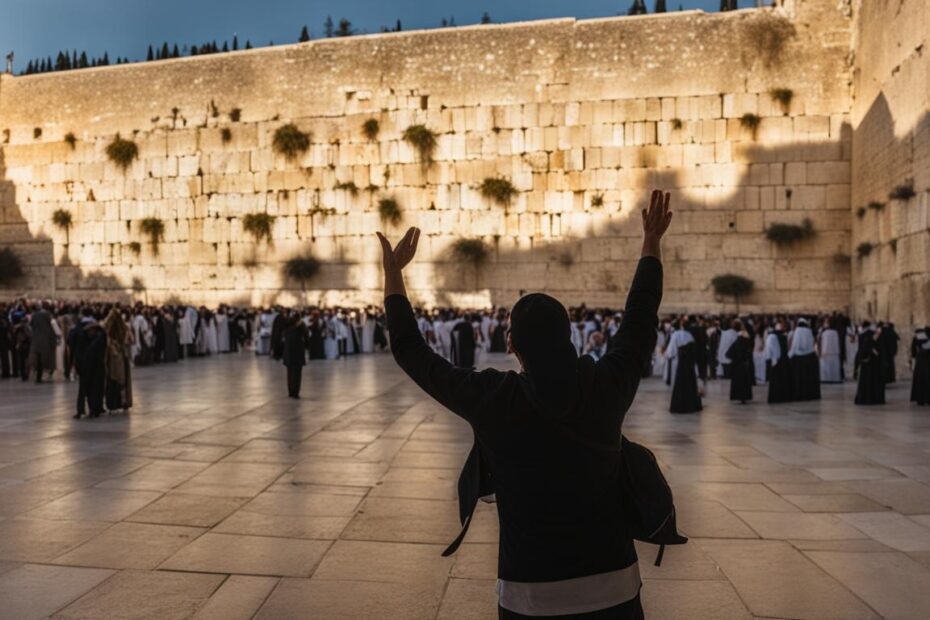In Judaism, supplication is more than just prayer – it is a profound and heartfelt expression of faith. It is through supplication that individuals connect with God, seeking His guidance, blessings, and forgiveness. Rooted in tradition and accompanied by rituals and recitations, supplication is a spiritual act of surrender and devotion.
Key Takeaways:
- Supplication is an integral aspect of the Jewish religious practice and belief system.
- It allows individuals to communicate with God and seek His guidance, blessings, and forgiveness.
- Supplication is deeply rooted in Jewish tradition and is accompanied by specific rituals and recitations.
- It is seen as a spiritual act of surrender and devotion, fostering a deep connection with the divine.
- Through supplication, individuals can experience personal growth, transformation, and a deeper understanding of their relationship with God.
The Importance of Supplication in Judaism
Supplication holds immense importance in Judaism. It is a deeply ingrained practice that allows individuals to express their gratitude, seek forgiveness, and request guidance and blessings from God. Through supplication, Jews can forge a profound connection with the divine and cultivate spiritual growth and transformation.
The Jewish community has a long-standing tradition of supplication, with a rich repertoire of prayers and rituals specifically designed for this purpose. These traditional Jewish prayers, passed down through generations, are found in the Siddur, the Jewish prayer book. They form an integral part of both communal and personal worship, providing a structured framework for supplicating to God.
Supplication in Judaism not only serves as a means of individual communication with the divine but also fosters a sense of unity within the Jewish community. The collective act of supplication during services and gatherings creates a shared spiritual experience, reinforcing the bonds of faith and reinforcing the values and teachings of Judaism.
To fully appreciate the importance of supplication in Judaism, it is necessary to understand the profound impact it has on individuals’ spiritual journeys. Through sincere and heartfelt prayers, Jews are able to connect with their innermost thoughts and emotions, gaining clarity and inspiration. Supplication allows individuals to seek guidance, find solace, and experience the transformative power of a deep and personal relationship with God.

Table: Traditional Jewish Prayers
| Prayer | Purpose |
|---|---|
| Shema | Declaration of faith and unity with God |
| Amidah | Central prayer expressing praise, gratitude, and requests |
| Modeh Ani | Prayer of gratitude recited upon waking up |
| Tefillat Haderech | Prayer for a safe journey |
| Tashlich | Prayer recited during the High Holidays to symbolically cast away sins |
The Rituals and Practices of Supplication in Judaism
In Judaism, supplication is accompanied by various rituals and practices that enhance the spiritual experience. Daily prayers, known as Tefillah, form an essential part of Jewish life and provide a dedicated time for supplication. These prayers are recited multiple times a day and follow a structured format, incorporating specific blessings and petitions. The Siddur, the Jewish prayer book, serves as a guide for these prayers, offering a rich collection of supplications for different occasions and needs.
The Siddur provides a comprehensive framework for Jewish worship, including blessings, known as Berachot, that are recited before and after specific actions. These blessings express gratitude and seek divine favor, bringing a spiritual dimension to everyday activities. For example, before eating, Jews recite a blessing to acknowledge the sustenance provided by God.
Additionally, there are specific practices and rituals associated with supplication, such as the act of standing or bowing during certain prayers. These physical movements serve as a way to engage the body in worship and demonstrate reverence and humility before God. The rituals and practices of supplication in Judaism create a deeply immersive experience, allowing individuals to connect with the divine and fulfill their spiritual obligations.
Table: Examples of Supplication Rituals and Practices in Judaism
| Ritual/Practice | Description |
|---|---|
| Tefillah (Daily Prayers) | Recited multiple times a day, structured format, includes specific blessings and petitions |
| Berachot (Blessings) | Recited before and after specific actions to express gratitude and seek divine favor |
| Physical Movements | Standing or bowing during prayers to demonstrate reverence and humility |
These rituals and practices of supplication in Judaism not only deepen the connection between individuals and God but also foster a sense of communal worship. They provide a framework for expressing gratitude, seeking guidance, and finding solace in times of need. Supplication in Judaism is a transformative spiritual practice that encompasses both personal devotion and communal prayer, enriching the lives of Jewish individuals and communities.
The Spiritual Significance of Supplication in Judaism
In Judaism, supplication carries deep spiritual significance, serving as a pathway to connect with the divine and nurture one’s faith. It is through supplication that individuals express their deepest desires, seek divine guidance, and surrender their ego to the will of God. By engaging in sincere and heartfelt prayers, believers cultivate a profound sense of trust and reliance on God’s mercy and wisdom.
Supplication is seen as a transformative spiritual practice, allowing individuals to engage in introspection, reflection, and personal growth. Through supplication, one can access their innermost thoughts and emotions, creating an intimate dialogue with the divine. It is believed that by embodying humility and vulnerability in supplication, individuals open themselves up to divine grace, blessings, and spiritual enlightenment.
Jewish prayers, encompassing a diverse range of rituals and recitations, serve as a vehicle for supplication. The Siddur, the Jewish prayer book, offers a repository of prayers for various occasions and needs, providing believers with a rich tapestry of supplications to deepen their connection with God. Supplication in the Jewish faith is not merely a mechanical act, but a deeply personal and spiritual endeavor that allows individuals to foster a sense of purpose, meaning, and divine presence in their lives.
The Power of Supplication
“Through supplication, we access the divine within ourselves and lay bare our hopes, dreams, and fears before God,” says Rabbi David Cohen. “It is in these moments of vulnerability and surrender that we find the strength to navigate life’s challenges and forge a deep connection with the divine. Supplication has the power to transform our lives and cultivate a profound sense of faith and spiritual growth.”

The Role of Supplication in Jewish History
Throughout history, supplication has played a vital role in the lives of Jewish individuals and communities. From biblical times to the present day, Jewish prayers and supplication practices have served as a source of strength, hope, and unity in the face of adversity. The historical significance of Jewish prayers can be seen in the stories and experiences of the Jewish people, where supplication has been a powerful tool of faith and resilience.
During times of persecution and hardship, Jewish martyrs often turned to prayer and supplication as a final act of devotion and defiance. Their unwavering faith and reliance on God’s guidance sustained them in the face of unimaginable challenges. These prayers became a means of seeking solace, finding hope, and strengthening their connection to the divine. The collective memory of Jewish history is marked by the enduring legacy of supplication.
Supplication has been the voice of the Jewish people, carrying their deepest desires, fears, and dreams. Through prayer, they have found solace, hope, and a sense of unity in their shared faith.
Supplication in Jewish history extends beyond individual acts of devotion. It has played a central role in communal worship, bringing together Jewish communities in times of celebration and mourning. Collective supplication has allowed for the sharing of joys, sorrows, and aspirations, fostering a sense of belonging and connectedness among the Jewish people.
| Time Period | Historical Events |
|---|---|
| First Temple Period (960 BCE – 586 BCE) | Prayers and supplication offered at the Temple in Jerusalem as a means of seeking God’s favor and guidance. |
| Second Temple Period (516 BCE – 70 CE) | Prayers and supplication continued at the Second Temple, serving as a spiritual anchor for the Jewish community. |
| Holocaust and World War II (1939 – 1945) | Jewish prisoners and victims of the Holocaust made supplication their final act of faith, demonstrating their unwavering connection to God. |
| Modern Era | Supplication remains an integral part of Jewish worship and cultural heritage, providing comfort and guidance to individuals and communities. |
The Power of Supplication in Personal Spiritual Journey
Supplication is a transformative practice that holds immense power in one’s personal spiritual journey. It allows individuals to embark on a deep exploration of their inner selves, connecting with their deepest desires, hopes, and fears. Through supplication, individuals can tap into a profound source of strength, guidance, and inspiration, fostering a sense of purpose and meaning in their lives.
The act of supplication goes beyond the mere recitation of words; it is a heartfelt expression of vulnerability and trust in the divine. By opening oneself up to the power of supplication, individuals invite a higher presence into their lives, paving the way for personal growth and transformation.
Supplication is not confined to the boundaries of religious rituals but extends to every aspect of one’s life. It is a way of seeking divine intervention and guidance in navigating life’s challenges and making important decisions. Through supplication, individuals can find solace, clarity, and peace of mind amidst the uncertainties of life.
The transformative nature of prayers and supplication lies in their ability to bring about a profound shift in perspective and consciousness. Through sincere and heartfelt supplication, individuals can release negative emotions, find forgiveness, and cultivate a sense of gratitude. This process allows them to let go of past grievances, heal emotional wounds, and embrace a more compassionate and loving way of being.

Supplication has the power to awaken one’s spiritual potential, providing a pathway to self-discovery and self-realization. Through this practice, individuals can develop a deeper understanding of themselves, their purpose, and their connection to the divine. It is a journey of self-exploration and transformation that leads to a heightened sense of joy, peace, and fulfillment.
The Enduring Legacy of Supplication in Judaism
Supplication has left an indelible mark on the Jewish faith, with its enduring legacy resonating through generations. The impact of supplication can be seen in various aspects of Jewish life, from religious rituals to cultural practices. Jewish prayers, rich in tradition and depth, continue to inspire and provide solace to individuals and communities worldwide.
Throughout history, supplication has served as a source of strength and unity for the Jewish people. In times of adversity and persecution, prayers have offered comfort and hope, becoming a lifeline for those facing challenges. The act of supplication has fostered resilience and a sense of shared purpose, binding Jews together as they navigate the complexities of life.
Supplication’s impact extends beyond religious worship. It has influenced various facets of Jewish culture and ethics, shaping the values and beliefs of the community. Jewish prayers serve as a reminder of the importance of faith, compassion, and justice, urging individuals to strive for a better world.
The enduring legacy of supplication in Judaism is a testament to its power and significance in the lives of believers. It continues to inspire spiritual growth, strengthen connections with the divine, and provide unwavering support in times of joy and sorrow. Through the ages, Jewish prayers have truly stood the test of time, leaving an indelible mark on the hearts and souls of those who seek solace, guidance, and a deeper connection with God.
Conclusion
Supplication in Judaism is a profound spiritual practice that enables individuals to connect with God on a deep and personal level. It holds immense importance in Jewish tradition, allowing for expressions of gratitude, seeking forgiveness, and requesting guidance and blessings. Through supplication, individuals can experience spiritual growth and transformation, deepening their relationship with the divine.
The rituals and practices of supplication in Judaism, such as daily prayers and blessings, provide a structured framework for connecting with God. These prayers, passed down through generations, serve as a guide for Jewish communal and personal worship, fostering unity and a shared sense of purpose.
Supplication in Judaism has a deep spiritual significance, serving as an act of surrender and trust. It opens the channels for divine grace and blessings, leading to moments of connection, clarity, and inspiration. Throughout Jewish history, supplication has been a source of strength and hope in times of adversity, fostering resilience and a sense of unity among the Jewish people.
The enduring legacy of supplication in Judaism continues to impact and inspire the lives of Jews around the world. It remains a powerful tool for personal spiritual growth, creating moments of introspection and self-improvement. Supplication’s influence extends beyond religious rituals, shaping the cultural, social, and ethical aspects of Jewish life. With its central place in Judaism, supplication serves as a bridge between individuals and God, fostering faith, unity, and a deep connection to the divine.
FAQ
What is supplication in Judaism?
Supplication is a heartfelt form of prayer in Judaism that allows individuals to communicate with God, seeking His guidance, blessings, and forgiveness.
Why is supplication important in Judaism?
Supplication holds immense importance in Judaism as it enables individuals to express gratitude, seek forgiveness, and request guidance and blessings from God, fostering a deep connection with the divine.
What are the rituals and practices associated with supplication in Judaism?
Supplication in Judaism is accompanied by various rituals and practices, including daily prayers (Tefillah) and recitations from the Jewish prayer book (Siddur), as well as blessings (Berachot) before and after specific actions.
What is the spiritual significance of supplication in Judaism?
Supplication in Judaism is seen as a way to deepen one’s relationship with God, seek spiritual nourishment, and experience profound moments of connection, clarity, and divine inspiration.
What role has supplication played in Jewish history?
Throughout history, Jews have turned to prayer and supplication in times of persecution, hardship, and challenges, with prayers serving as a source of strength, solace, and hope, fostering resilience and unity.
How does supplication impact personal spiritual growth?
Supplication allows individuals to engage in introspection, reflection, and self-improvement, providing a means to express dreams, desires, and hopes to God, leading to personal growth and a deeper understanding of oneself and their relationship with God.
What is the enduring legacy of supplication in Judaism?
Supplication has been passed down through generations, preserving the rich spiritual heritage of the Jewish people and providing comfort, guidance, and solace. It has influenced not only religious rituals but also the cultural, social, and ethical aspects of Jewish life.
What is the conclusion regarding supplication in Judaism?
Supplication in Judaism holds a central place in communication between individuals and God, serving as a powerful means for deep connection, personal growth, and transformation. Its enduring legacy continues to inspire and impact the lives of Jews worldwide, fostering faith, unity, and connection to the divine.








